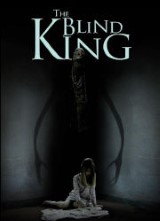
![]()
Writers: Lorenzo Paviano, Raffaele Picchio
Director: Raffaele Picchio
When evil comes knocking
I started watching The Blind King (aka Dark Silence) expecting a traditional haunted house/possessed child affair. Oh boy was I wrong. In reality this Italian film is a lot stranger and darker than that – probably unclassifiable.
Things start in a fairly standard manner with Craig (Aaron Stielstra) and his young daughter Jennifer (Eleonora Marianelli) moving into a new house. However the silence, lack of smiles and camerawork make it obvious that this is no happy move. We soon discover the reason: Craig’s wife Helen died a little while back and since then Jennifer hasn’t spoken a word.
At this stage it’s still pretty standard stuff, albeit more stylish than usual. We have a lot of clichés including Jenni’s strange drawings, a creepy attic and dolls. It’s also very downbeat and depressing stuff. Jenni’s only friend is a doll called Maggie and Craig’s only friend is his sister Susan (Désirée Giorgetti) with whom he is constantly arguing. Susan considers Craig a loser and it’s clear that she’s right, he is. He’s also – understandably – under a lot of stress and having bad dreams itself.
Most of the first twenty minutes is like this, nothing much happening apart from scene setting and conversation. However things change when we see inside one of Craig’s nightmares. This is appropriately surreal and suggests a man racked not just with grief but with guilt.
It soon becomes apparent that the focus of the story isn’t so much Jenni as Craig. As his nightmares worsen he starts to believe that he’s actually sharing them with Jenni (mutual dreaming). In fact, he thinks they might be real.
Which is especially disturbing given the nature of the demonic-looking Blind King who rules over this dream world.
So the whole thing moves gradually from a ghost/possession motif to an examination of Craig’s psyche. Is it real or imagination? Surprisingly there’s little room for the dualism I’d normally expect from this sort of theme. The suggestion is clearly that the Blind King is an actual supernatural manifestation rather than just a subconscious one. However it is possible to interpret things purely symbolically if you’re willing to give a little leeway to the final scene.
Craig is very much a tragic figure and much of the symbolism of the movie refers to Oedipus, especially the Sophocles play Oedipus Rex. However there are also references to Orpheus with clear allusions to the story of Eurydice. At one point Craig even says: “I will enter Hell for Jenni”. This sets up the final act… which didn’t play out exactly as I expected.
It has to be said that there’s a lot of dialogue in this film, probably too much for most people. At times it was even too much for me; I was happier when Picchio was showing rather than telling. There are also minor pacing issues, especially near the start. At the beginning I wasn’t sure I was going to be very impressed, but as it went on and the actual themes became clear I really warmed to it.
If you go into The Blind King expecting traditional ghosts, frights and horrors you’re going to be disappointed. What you actually get is a journey into the increasingly fractured psyche of a man forced to confront his failure, grief and guilt. It’s not a pleasant trip but it is a compelling one.